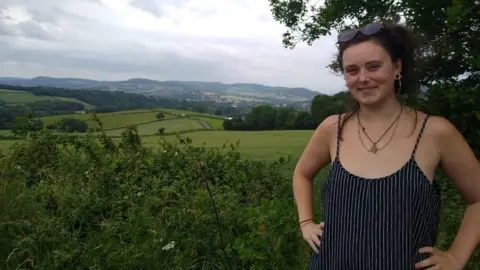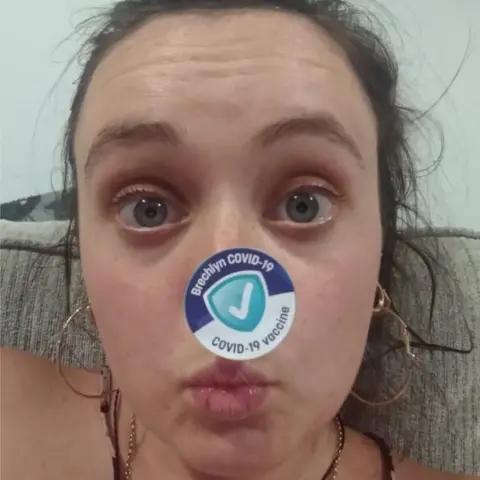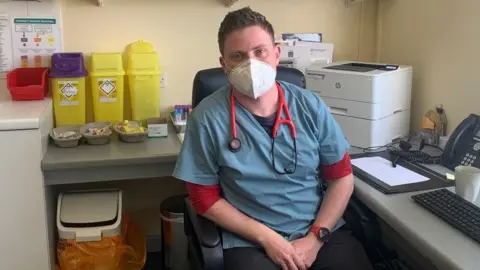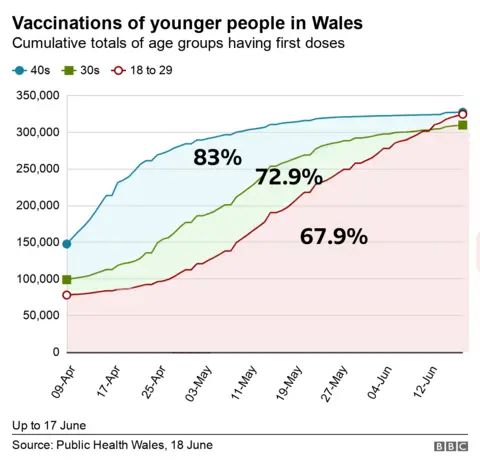Covid: 'It took me almost all day to get my coronavirus vaccine'
 Ellie Morgan
Ellie MorganEllie Morgan's Covid jab appointment was just 20 minutes but actually getting the vaccine took her all day.
The 26-year-old is in the under-40 age range advised against having the Oxford AstraZeneca vaccine, so she had to get to her local mass vaccination centre.
But she lives in a rural part of Wales and had to rely on public transport to get her Pfizer vaccination dose.
It comes as a GP says more should be done to help some young people in rural areas get to their vaccine appointment.
The Welsh government said its health service had built a "mix of sites" for Wales' largest vaccination programme - almost 450 jab locations - to not just "meet the characteristics of the vaccines" but to be "conveniently located" to as many people as possible.
Ellie had to go to a mass clinic as that's where the sub-zero temperature freezers are storing the Pfizer doses for under-40s due to the rare blood clot link.
Her appointment was at 13:30 BST last Wednesday - and in a car the journey would be about 45 minutes.
But Ellie did not have access to a car, and there were just seven buses a day between her home town of Monmouth in south Wales and the mass clinic in Newport.
"It was an hour there by bus but I also had to arrive two hours before my allotted time, as the next bus from Monmouth would've made me miss my appointment," she said.
 Ellie Morgan
Ellie Morgan"All my friends and family work in the week so it wasn't possible for a lift from anyone," she said.
"I also consider environmental reasons quite highly and try wherever possible to use public transport.
"It was all fine, however it ended up being a whole day's activity and meant that any other plans that day were off the table. Also if I had missed that one bus, then there would have been no way for me to get there other than taxi, which I dread to think how much that would cost."
Ellie works as an offshore geotechnical engineer, so it wasn't just a case of working out how to get to her jab, it was ensuring she was home for it too.
"The actual jab part of it took less that 20mins," she said. "That bit was super efficient!"
 Ellie Morgan
Ellie MorganBut after leaving her house at about 10:00 to make the trip for her jab, she arrived home after 17:00, because the next bus back to Monmouth was a few hours after her vaccine.
"The way my job is, it wasn't that bad," she said.
"But for people with normal jobs, it would have been a whole day off work. It's nothing major but just pretty awkward and inconvenient."

Of those people in Wales aged 18 to 29, almost 68% (323,965 people) have had their first jab while almost 73% (309,352) of those in their 30s have had a first dose
Local authorities in the Aneurin Bevan health board area - topped by Caerphilly and Monmouthshire - lead the way with giving first doses to those in their 30s, reaching more than 80%, while north Wales areas had reached the fewest, about two-thirds.
As for those aged 18 to 29, Monmouthshire and Caerphilly again lead the way with more than 75%, while west Wales areas and Bridgend have reached the lowest proportions, including less than half in Ceredigion.

All adults in Wales have been offered a first dose of the Covid vaccine, with almost 1.5m people receiving both doses.
But one rural doctor wants more to help some young people in rural areas get to their Covid vaccination appointments.
"The next challenge we need to sort is getting the Pfizer vaccine out to people under 40 in rural areas," said Dr Eilir Hughes, who runs a practice in the Gwynedd coastal village of Nefyn.
"Younger people need to have this particular vaccine, and can't be given the AstraZeneca jab.
"But up to now, the Pfizer vaccine has mainly been administered in the mass vaccination centres such as Llandudno and Bangor, because it needs to be stored at low temperatures."
 Dr Eilir Hughes
Dr Eilir HughesFor example, to travel between his practice on Gwynedd's Llŷn Peninsula to the centre in Bangor on public transport could take more than two hours, even though it is less than 30 miles away.
"Bangor and Llandudno are a long way from rural communities like the one where I work in Nefyn, and from places like Aberdaron and Pwllheli," he added.
"We need to crack this one to reach the right level of immunity around all communities in Wales, urban, rural and everywhere."
In north Wales, Betsi Cadwaladr University Health Board has held Pfizer vaccine clinics in Ysbyty Alltwen, near Porthmadog, and in Dolgellau.
"Those are a good start, but we need to get more uptake and more flexibility," Dr Hughes told Radio Wales.


"With the Pfizer vaccine it is more fragile, you have to take more care and the logistics element is more of a challenge than AstraZeneca.
"You've got almost a month to use up that vaccine, we have to be more agile, we have to be able to offer the clinics at more flexible times for people who are working... people who have been drastically affected by the lockdown.
"We need to make it as smooth of a process as possible for them."
He added that GP surgeries may be able to help to increase uptake.
"Perhaps we can do more vaccination with the Pfizer vaccine, and more importantly, reach out into our local communities and connect with people to get them vaccinated."
The Welsh NHS is currently administering vaccinations in 446 locations across Wales, including 52 mass vaccination centres, 301 surgeries, 39 pharmacies, 20 hospitals and 27 mobile jab teams.
"To deliver the largest vaccination programme Wales has ever seen, we have been building an infrastructure from the ground-up," said a Welsh government official.
The government added there is a "mix of sites to maximise speed of roll-out, ensure safety, meet the needs of the characteristics of the vaccines, be as conveniently located as possible and, importantly, make sure we give equitable access across the country and all communities".
